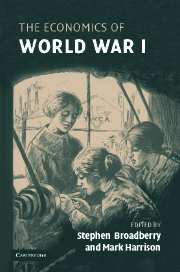Book contents
- Frontmatter
- Contents
- List of figures
- List of tables
- List of contributors
- Acknowledgements
- Introduction
- 1 The economics of World War I: an overview
- 2 The pity of peace: Germany's economy at war, 1914–1918 and beyond
- 3 Austria-Hungary's economy in World War I
- 4 The Ottoman economy in World War I
- 5 Between the devil and the deep blue sea: the Dutch economy during World War I
- 6 Was the Great War a watershed? The economics of World War I in France
- 7 The United Kingdom during World War I: business as usual?
- 8 Poor Russia, poor show: mobilising a backward economy for war, 1914–1917
- 9 Italy at war, 1915–1918
- 10 Until it's over, over there: the US economy in World War I
- Index
- References
1 - The economics of World War I: an overview
Published online by Cambridge University Press: 23 July 2009
- Frontmatter
- Contents
- List of figures
- List of tables
- List of contributors
- Acknowledgements
- Introduction
- 1 The economics of World War I: an overview
- 2 The pity of peace: Germany's economy at war, 1914–1918 and beyond
- 3 Austria-Hungary's economy in World War I
- 4 The Ottoman economy in World War I
- 5 Between the devil and the deep blue sea: the Dutch economy during World War I
- 6 Was the Great War a watershed? The economics of World War I in France
- 7 The United Kingdom during World War I: business as usual?
- 8 Poor Russia, poor show: mobilising a backward economy for war, 1914–1917
- 9 Italy at war, 1915–1918
- 10 Until it's over, over there: the US economy in World War I
- Index
- References
Summary
Introduction
Globalisation has been under way for centuries. The modern wave of globalisation that dates from the early nineteenth century gave a significant boost to world trade, world capital flows, and worldwide migration, with great powers competing for colonial empires on a global scale. The Great War of 1914 to 1918 then interrupted and, for a time, set into reverse the process of globalisation.
How did globalisation lead to war? At first sight it was the competition for colonies that ran out of control. Britain and France, the established powers of ‘old’ Europe, had established a condominium over most of Africa and much of Asia; Germany, the rising power of ‘new’ Europe, had no colonies to speak of, wanted some, and expected to get them at the expense of the French and the British. Behind this lay a perception that world power was a zero-sum game. Since Adam Smith, the Anglo-Saxon liberals had argued that trade was a game from which all could benefit at once. But in the late nineteenth century liberalism was being challenged by a new nationalism that gave more weight to the control of territory and settlement than to trade and competition. When it came to territory, the supply was fixed and there was only so much to go round. Therefore, the new nationalists reasoned, it was worth Germany's while to break up world trade for a while in order to grab territory from the older powers.
- Type
- Chapter
- Information
- The Economics of World War I , pp. 3 - 40Publisher: Cambridge University PressPrint publication year: 2005
References
- 23
- Cited by

